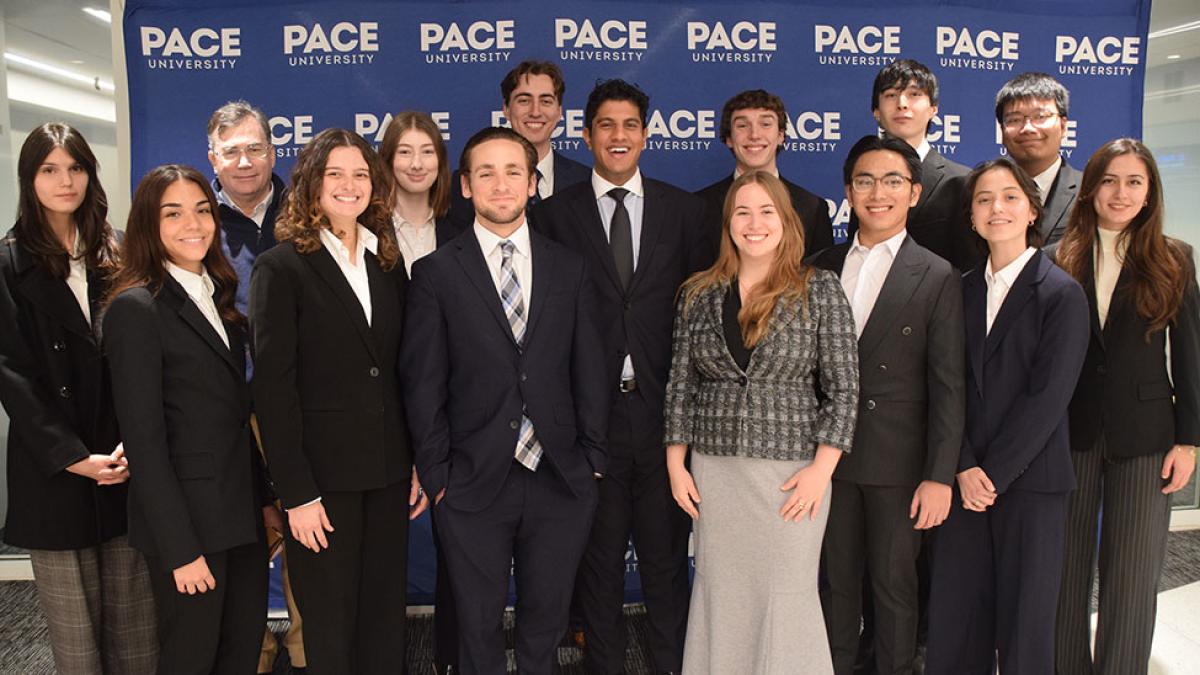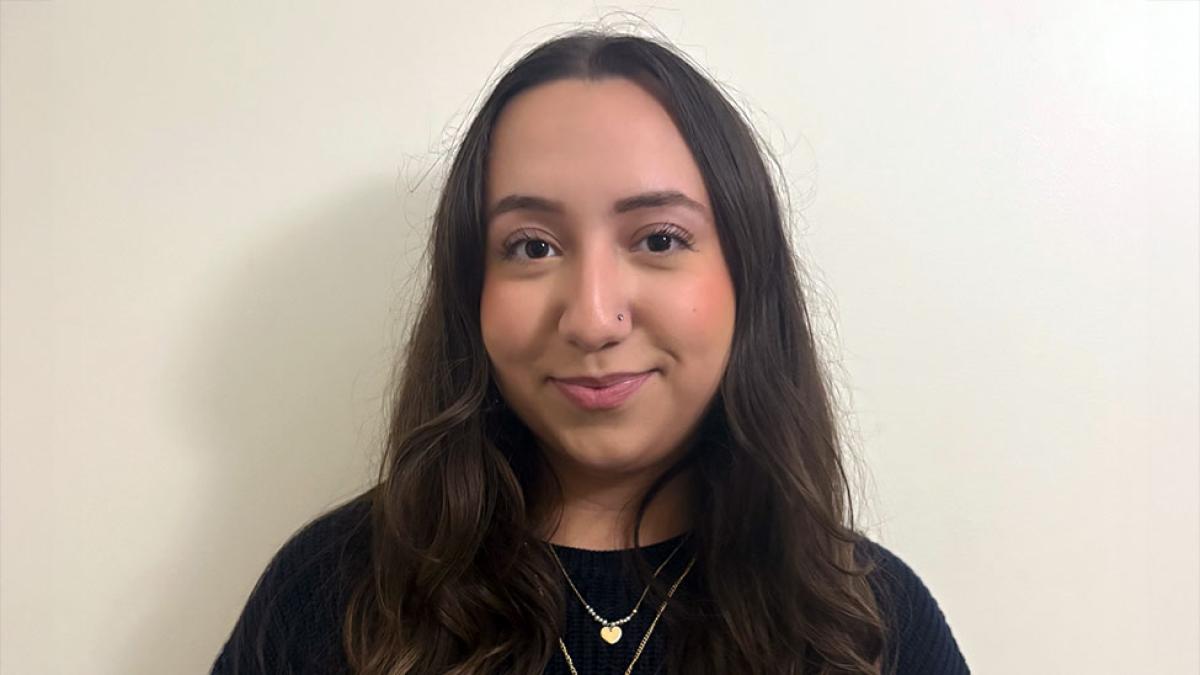For the sixth time since 2014, Pace University’s Economics students have claimed the national title at the College Federal Reserve Challenge—continuing a legacy of excellence built on rigorous preparation, teamwork, and real-world economic analysis.
Tackling the Pandemic
From the psychological effects of social distancing, to the economic impact of the COVID-19 crisis, the Dyson College community is working to advance our understanding of the ongoing pandemic. Student, faculty, and alumni researchers are working on a wide range of projects with both immediate relevance, and long-term implications, that will enable the world to move forward.
Here’s a look at some of the most significant work so far.
Mental health
The pandemic has undoubtedly had a significant impact on psychological wellbeing, and Associate Clinical Professor Linda Escobar Olszewski, PsyD, is studying the effects on one specific student group: athletes.
“The financial implications of COVID-19 resulted in early career termination of thousands of athletes across the country, throwing them into an identity crisis during a time of global instability,” she said. “Our study aims to investigate the double burden of COVID-19 plus early forced ‘retirement’ on NCAA athletes’ identity, health behaviors, self-esteem, and mental health.”
Escobar Olszewski, who is also the clinical director of Pace’s McShane Center for Psychological Services, is working with Mitchel Figueroa ’25, PsyD, and two outside researchers.
She notes that since the onset of the COVID-19 crisis, mental health concerns among athletes are up as much as 250 percent from the NCAA’s highest previously reported totals.
“Having a better understanding the mental health impacts of the double-burden of COVID-19 and forced ‘retirement’ may highlight and capture the degree of impact these combined events have on student-athletes, and may inform universities of the mental health needs of student-athletes that results from the disruption, a population that has a great need for services, but whose mental health is often overlooked,” Escobar Olszewski said.
Her colleague, Barbara A. Mowder, PhD, is looking at another group: parents. As a researcher, one of Mowder’s core projects has been the development of the Working with Parents Manual, a training manual for counselors, psychologists, and other mental health professionals on working with parents and/or those who anticipate parenting in the future. The goal is to design a tool to assist parents in acquiring the understanding and behaviors to support the developmental needs of their children. With the onset of the COVID-19 pandemic, Mowder began working with several Doctor of Psychology (PSYD) in School-Clinical Child Psychology students to assess the efficacy of the manual and the ways in which the virus may be impacting parents and parenting.
“This research has the potential to discern the myriad ways in which the pandemic has affected individuals in terms of their parent role and associated parenting behaviors,” Mowder said. “In turn, it may assist mental health professionals in identifying parenting needs during this time of increased stress as well as developing options and avenues for fostering parenting strengths.”
Economic ramifications
Data shows that during the Great Recession of 2008, workers in occupations that could be most easily automated by mechanization or technology experienced job losses in greater numbers. Julieth Saenz Molina ’15, Economics, coauthored a report for the Federal Reserve Bank of Philadelphia looking at how the same trend is occurring now as a result of the pandemic.
“While the research focused on the short-term effects of automation during the pandemic, a prolonged economic crisis could lead to permanent job losses due to increases in labor-replacing automation, such as it happened after the Great Recession,” Saenz Molina said.
She was involved in several research projects as a Pace student, and plans to continue monitoring the trends of automation based on updated employment data, as well as the broader economic impacts of the COVID-19 pandemic and the responses by different governments.
“I am currently working on analyzing the role cash transfers have had in aiding nations in overcoming the detrimental effect of the pandemic on economic development,” Saenz Molina said.
The effects of remote work
Two Department of Public Administration faculty members are looking at how different groups of workers are being affected.
Associate Professor and Department of Public Administration Chair Gina Scutelnicu, PhD, has coauthored a paper analyzing how telework is impacting government workers. The research looked at how successful the transition to forced telework has been for federal employees during the COVID-19 crisis and how working experiences and arrangements adopted during COVID-19 may affect the future of telework.
“This study is among the first ones to examine telework in a comprehensive way through self-reported narratives of federal workers, thus assessing the lived experiences of telework in a holistic way,” Scutelnicu said.
Her findings indicated a generally positive perception of the transition to full-time telework in terms of productivity, performance and work-life balance, with the exception of working parents. Results were more mixed in terms of job satisfaction, social integration and supervisor support; however, data also showed that federal employees anticipate more work will become remote-eligible as society moves to a new normal. This suggests that while there are challenges that public and nonprofit organizations need to address for a remote workforce, telework can be an attractive human resource management strategy for both emergency preparedness and recruiting younger employees.
Clinical Assistant Professor Ric Kolenda, PhD, is looking at how the COVID-19 pandemic has affected gig workers. He began studying this freelance workforce in 2009, and since then it has continued to disrupt and shape our economy in new ways.
“Gig workers are a small but growing part of the economy, but more importantly, they have shown to be critical during the last several months, while also being exposed to the virus at higher rates along with other essential workers,” Kolenda said.
In addition to providing a better understanding of conditions for gig workers during the pandemic, he hopes his current research will help identify creative solutions to the unique issues they’re facing.
Kolenda plans to complete the research with the help of a paid graduate assistant.
Public perception and stopping the spread
“Understanding how the public perceives novel coronavirus/COVID-19 is a critical factor in developing public health strategies to reduce the disease spread and for treatment and prevention planning,” Clinical Associate Professor Christopher Godfrey, PhD, said.
Godfrey, who is also director of undergraduate psychology on the New York City campus, is examining how various factors—including sociodemographic characteristics, housing, access to services, and health psychological considerations such as risk perception, health literacy, and trust in government—may influence American adults’ perceptions of COVID-19, seasonal influenza, and vaccines and treatments for these diseases.
The main project is a national survey of 3,000 individuals, and graduate students are leading secondary investigations focusing on the experiences of women, communities of color, first responders, and economically disadvantaged populations. In partnership with Professor of Psychology June Chisholm, PhD, and Associate Professor of Psychology Michele Zaccario, PhD, they will be looking at topics including how the pandemic is affecting online and family social networks and parenting practices of new moms, regional differences in African-American women’s COVID-19-related health care experiences, and health information literacy and COVID-19 risk among high COVID-risk groups.
Valerie Patritti ’20, MS in Biochemistry and Molecular Biology, is on the front lines of the pandemic. As a fellow of the Association of Public Health Labs and US Centers for Disease Control and Prevention, she is analyzing the genetic code of SARS-CoV-2 genomes. The purpose of her work is to decipher the genetic code of individual virus samples in New York City and determine if SARS-CoV-2 is changing through genetic mutation, with the goal of using the information to help with surveillance and contact tracing efforts.
She gained the experience necessary to prepare her for this research while a student at Pace, where she worked closely with chemistry professors Zhaohua Dai, PhD, and Nigel Yarlett, PhD.
“Even though the pandemic has been a difficult time for many, I am happy to have been given this unique opportunity to aid in a national emergency,” Patritti said.


